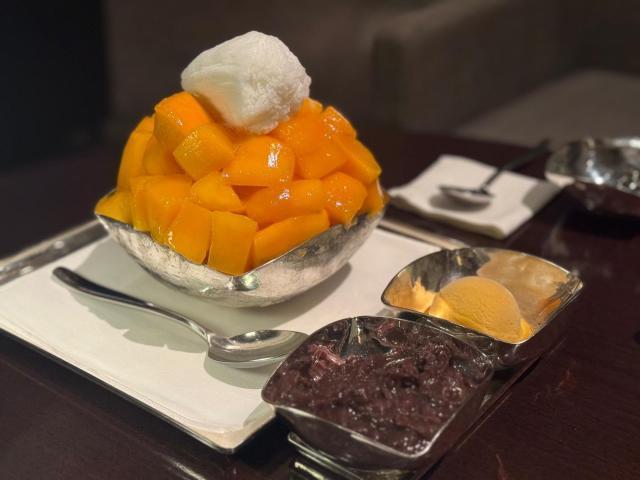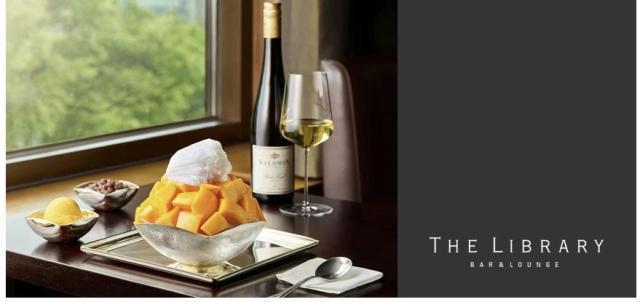
SEOUL, May 28 (AJU PRESS) - Having a bowl of shaved ice topped with tropical fruits at luxury hotels has become an irresistible fad among young Koreans. The summer refreshment, called bingsu in Korean, offers a taste of luxury hotel experiences and becomes a popular trend propagated on Instragram. Traditionally served with sweet toppings such as red beans, rice cakes, and a mix of fruits, the one featuring apple mangos has recently taken center stage.
The craze first began in 2008 when Hotel Shilla in central Seoul began serving the ice dessert featuring the juicy tropical fruits cultivated from Jeju Island. Other luxury hotels such as Four Seasons and Lotte, quickly followed suit.
With fresh ingredients and fancy decorations crafted by top-tier hotel chefs, the premium bingsu has reigned as one of the country's finest summer delicacies. But the treats made headlines again this summer with exorbitant prices amid soaring inflation.
Hotel Shilla, for example, sells its signature shaved ice featuring apple mangos for 102,000 won ($75). The price is far more expensive than the average office worker's lunch, while cafés and other franchise stores typically charge around 10,000 won, which is still considered pricy for a dessert. The price for a similar offering is 130,000 won at Signiel Seoul in posh Jamsil, southern Seoul and 126,000 won at Four Seasons in downtown Seoul.
Despite the steep price, the fruity bingsu at the five-star hotel, remains popular with a hordes of customers lining up even on weekdays. According to a hotel staffer, about 100 servings are prepared for weekdays and 150 for weekends. They are sold out almost every day, as people rush to taste them before they last until the end of August.
Upon entering a bar adorned in black and brown-colored décor on the hotel's first floor, blending modern elements with classic elegance, customers are escorted to their seats by a suit-clad waiter. The lounge is filled with the soulful vibes of live jazz music, with staffers constantly moving around to see if any assistance is needed.
Around 7 p.m. last Wednesday, only 15 servings of bingsu remained. About an hour later, there were only ten left with four out of 12 tables, occupied by customers, indulging in it. After the order, it took nearly 30 minutes for the dessert to arrive. It was served on a silver tray and under a transparent food dome. A waiter kindly explained how to enjoy the dessert, suggesting starting with the drupes on top before savoring the condensed milk underneath.
While the first bite may be less sweet than expected, the texture of the fresh mangos is unparalleled, silky yet not overly frozen. The ice is soft but not overly sweet. When almost finishing it, customers probably realize that the subtle sweetness is delicately calculated as the ample serving size could overwhelm them with excessive sweetness.
With so many pieces of apple mangos, customers should be attentive to avoid slipping them. Those who have a sweet tooth can ask for extra sherbet and handmade red beans to add to their serving. Given the nearly tenfold price compared to ordinary bingsu found next door, waiters check multiple times if the level of sweetness is satisfactory.
"The price isn't cheap at all," said a 29-year-old Lim Do-hee who splurged on the dessert that night. "But I can at least enjoy small luxuries within my budget."
"We're delighted to offer a menu that customers love. Their satisfaction with the dessert is much higher than expected," Kim Se-young, a sommelier at the hotel said. "Many of foreign customers also show interest in the menu and come again for more."

On a YouTube video introducing the hotel's bingsu, some comments read, "Regardless of taste or service, 100,000 won bingsu is just absurd for me," and "People go there just to get Instagramable pictures" as they look great and visually appealing.
"Sharing flashy photos on social media and receiving reactions from others can fulfill an innate human desire for being recognized," Lee Young-ae, a professor at Incheon National University told Aju Press on Monday. "Amid economic downturn, many people are unable to afford luxury items. By treating themselves with small luxuries like premium bingsu, they want to show off [their wealth or social status] through this conspicuous consumption."
Copyright ⓒ Aju Press All rights reserved.


![[TRAVEL] How cabbages in Gangwons mountainous areas beat summer heat](https://image.ajunews.com/content/image/2025/08/12/20250812171041546195_278_163.jpg)
![[K-Travel] A muddy summer like no other in Boryeong](https://image.ajunews.com/content/image/2025/07/30/20250730102736189187_278_163.jpeg)
